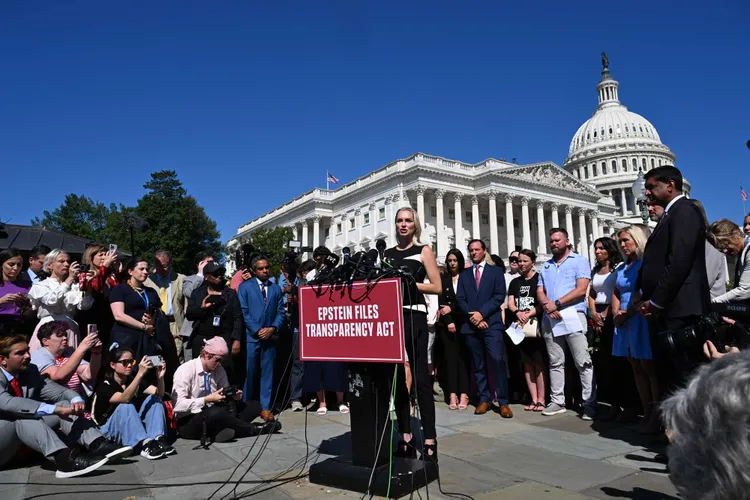On September 3, 2025, survivors of Jeffrey Epstein and Ghislaine Maxwell’s sex‑trafficking network, joined by newly identified accusers and the grieving family of the late whistleblower Virginia Giuffre, gathered on the steps of the U.S. Capitol. The goal: force the federal government to release every remaining unclassified document related to the Epstein investigation, including names and communications that have so far remained hidden. In emotional statements, survivors lamented that fewer than 1 percent of such files have been made public: a symbol, they say, of systemic secrecy and impunity.
A Bipartisan Push and a Discharge Petition
Supporting the survivors’ call are Representatives Thomas Massie (R‑KY) and Ro Khanna (D‑CA), co-sponsors of the Epstein Files Transparency Act. This bipartisan bill proposes a full public release of all unclassified documents pertaining to investigations of both Epstein and Maxwell.
To circumvent House leadership, Rep. Massie submitted a discharge petition, requiring 218 signatures to force a floor vote. As of the press conference, every Democrat in the House had signed on, and four Republicans, including Massie himself, Marjorie Taylor Greene, Nancy Mace, and Lauren Boebert, had also joined, leaving just two more GOP signatures needed.
Survivors Prepare Their Own “Client List”
Frustrated by continued government inaction, survivors announced plans to compile their own confidential list of individuals connected to the Epstein trafficking network. Led by survivor Lisa Phillips, this initiative is framed as a survivor-led accountability measure to expose those allegedly involved– even if official channels refuse to act.
Attorney Bradley Edwards criticized agencies, including the DOJ, CIA, and FinCEN, for withholding critical evidence, calling the survivors’ plan both necessary and morally urgent. Meanwhile, survivor voices echoed the sentiment that waiting decades for justice has stretched their patience to its breaking point.
Emotional Appeals and Political Obstacles
Several survivors shared harrowing first-person accounts at the rally. For many, it was their first time speaking publicly. Marina Lacerda, identified as “Minor‑Victim 1” in the original 2019 indictment, pleaded, “They have documents with my name on them … that could help me put the pieces of my own life back together.” Another survivor, Anouska De Georgiou, stressed the personal toll of trauma and the importance of transparency in healing: “This bill really matters.”
In a shocking twist, Donald Trump, who had previously supported the idea of releasing the files, publicly reduced the matter to politics, calling the push a “Democrat hoax that never ends.” Survivors described those words as “devastating.”
A Partial Document Release, But Not Enough
On September 2, 2025, the House Oversight Committee released approximately 33,295 pages of documents as part of an ongoing investigation led by Chairman James Comer. Yet critics note that the vast majority, around 97 percent, was already public, leaving only a small portion of newly disclosed material, such as certain flight logs from U.S. Customs and Border Protection. Survivors and lawmakers alike called this release superficial and insufficient.
In response, the discharge petition and the bill remain essential to compelling a thorough and transparent accounting.
Who Was Virginia Giuffre?
Virginia Louise Roberts Giuffre (August 9, 1983 – April 25, 2025) was a courageous advocate and key Epstein accuser. She founded the organization Speak Out, Act, Reclaim (SOAR), formerly known as Victims Refuse Silence, and became a leading voice for survivors of sex trafficking worldwide. Her passing earlier this year added poignant urgency to calls for transparency, as her family stood alongside survivors in demanding the release of every remaining document at the Capitol press event.
Why It Matters
-
Foundational transparency: Survivors and lawmakers argue that the continued withholding of records perpetuates a veil of secrecy around exploitation and shields powerful individuals connected to Epstein.
-
Legal and moral accountability: For survivors, waiting decades and being forced into silence by systemic inertia has inflicted additional trauma; full disclosure is key to justice and healing.
-
Demonstration of political will: The rare bipartisan cooperation, across party lines, signals a growing recognition that justice should transcend political divisions.
-
Public pressure as leverage: The combination of emotional testimonies, independent survivor actions, and legislative tools like the discharge petition reinforces that public outrage can and should bring action.
What Comes Next
-
Two more Republican signatures are needed to reach the 218 required for a forced vote on the House floor.
-
If achieved, the Epstein Files Transparency Act would mandate that the DOJ release all unclassified records related to Epstein, Maxwell, and any individuals referenced in connection to their crimes within 30 days.
-
The survivors plan to continue advocating, organizing, and holding the system to account even as they work on their own survivor-led “client list” to expose those not named in released files.
Summary Table
| Element | Description |
|---|---|
| Event | September 3, 2025, Capitol press conference by survivors, new accusers, and Giuffre family |
| Legislation | Epstein Files Transparency Act, backed by Massie (R) & Khanna (D) |
| Discharge Petition | Needs 218 signatures; so far, Democrats + 4 Republicans signed |
| Document Release | Oversight Committee released ~33k pages; mostly already public |
| Survivor Action | Announcing independent compilation of a “client list” |
| Opposition | Speaker Mike Johnson, White House, President Trump (calling it a “hoax”) |
| Why It Matters | Accountability, healing, deterrence, and ending secrecy |

